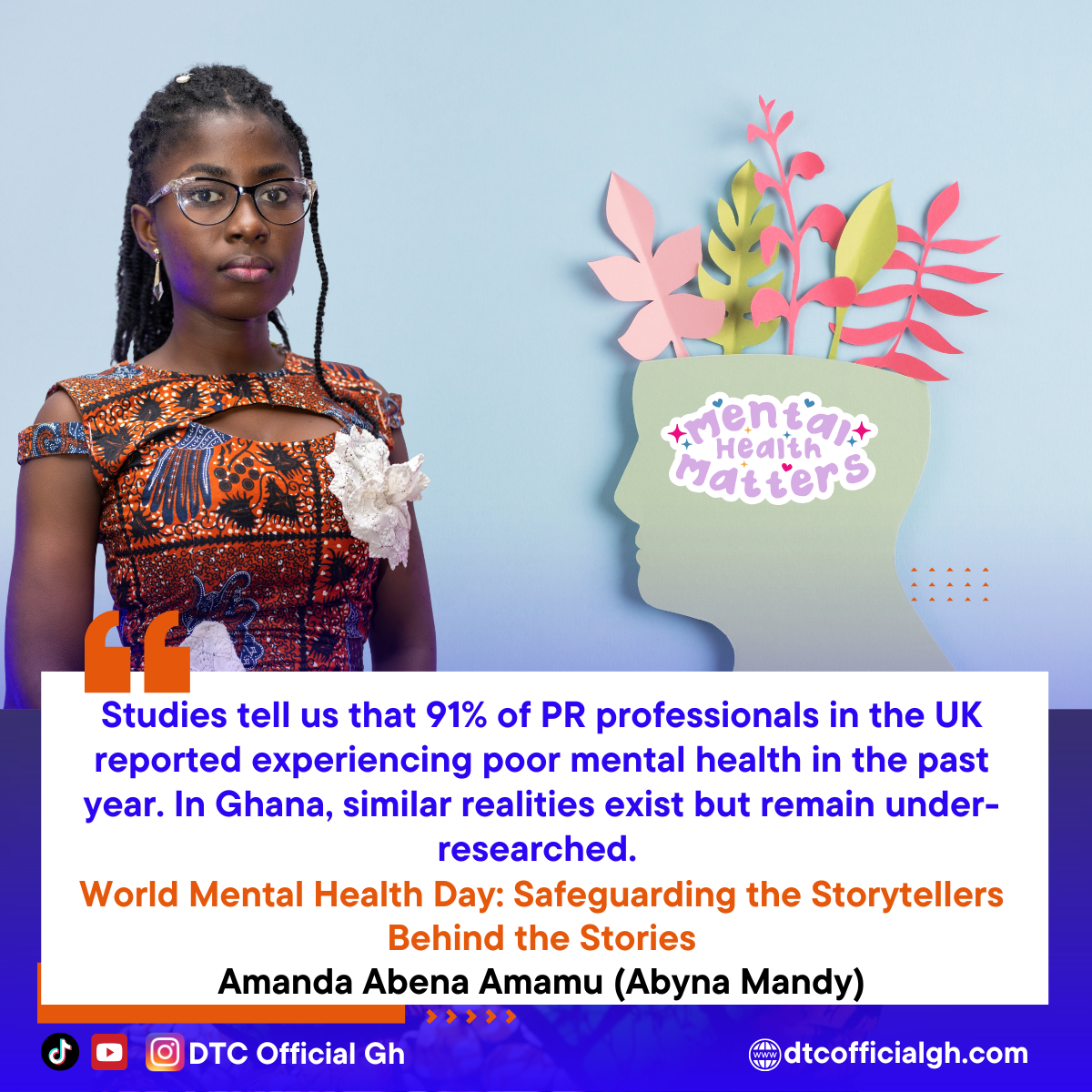Mental Health Day: Safeguarding the Storytellers Behind the Stories

Each year on October 10, we mark World Mental Health Day to shine a light on the crucial reality that mental health is not optional, even more so in emergencies. This year’s theme, “Mental Health in Humanitarian Emergencies” speaks to a truth that demands urgency. When the world shakes, people’s minds tremble too.
As communicators, i.e. Journalists, PR practitioners, Teachers, Creatives, we often stand in front of stories; war, disaster, poverty, crisis, human suffering, name them. We adapt narratives, amplify voices, and bear witnesses. But who bears ours?

The Weight of the Storyteller
Communications is often romanticized as glamorous, the press conferences, campaigns, trending content, and creative breakthroughs. But beneath it lies invisible pressure:
Journalists racing against deadlines, often covering crisis and trauma.
Teachers shouldering expectations of parents, communities, and systems.
PR professionals managing crises, public perception, and stakeholder relationships in real time.
Creatives building worlds of imagination, while silently fighting exhaustion and comparison.
READ ALSO: Exposure Is Not Enough: How Long, and To What?”
Studies tell us that 91% of PR professionals in the UK reported experiencing poor mental health in the past year (PRCA & CIPR). In Ghana, similar realities exist but remain under-researched. For example, research among teachers has shown high levels of stress, anxiety, and depressive symptoms over the course of a single school year, worsened by limited institutional support. We will do well to note that when the storyteller is unwell, the story itself is at risk.
The Invisible Load of the Storyteller
Our field is lauded for creativity and connection, but the emotional toll is rarely acknowledged – probably because we get carried away with the “heroic applauds”
In Ghana, despite an estimated 2.3 million people living with mental health conditions, only about 2% receive formal psychiatric aid. (WHO Africa-Ghana)
The treatment gap for mental health in Ghana ranges from 95% to 98%. (Weobong et al., 2023)
The Ghanaian mental health workforce is stretched, there’s approximately one mental health worker per 13,407 people. (Weobong et al., 2023)
Shockingly, among mental health professionals themselves, 41.3% report anxiety, 36% depression, 32.7% stress. (Bonsu et al., 2025)
Stigma remains formidable: Over 60% of Ghanaians believe mental illness is not a real illness; almost 79% viewed mental hospital patients as acting like “children.” (The stigma of mental illness in Southern Ghana)
These figures underscore that the system is fragmented, and Communicators, often at the intersection of public trust and narrative, are both observers and participants in it.
READ ALSO: Prof Elsie Effah Kaufmann Tops 2025 Trivia Hall of Fame
Why Mental Health Matters in the Comms Industry
Storytelling should be grounded in Authenticity
Audiences today are discerning. They can spot when a narrative feels forced. If communicators themselves are burnt out, the empathy and authenticity of their message is diluted.
It Affects Performance and Productivity
Creativity demands energy; whether we accept it or not. Stress, anxiety, and depression not only drain energy but can stunt innovation, the very currency of our industry.
Safe Spaces are Strategic
A healthy communicator creates healthier communities. When creatives, teachers, journalists, and PR professionals are supported, they are better positioned to shape stories that heal, inform, and inspire.
Case in Point: The Bawku Conflict and the Mental Health Narrative
The Bawku conflict illustrates the intersection between crisis, communication, and care. While media coverage often focuses on the violence, little attention is paid to the invisible emotional toll, both on those affected and those reporting it.
For the teacher, mental health support could mean learning trauma-informed teaching methods.
For the journalist, it’s access to probing sessions and ethical storytelling frameworks that avoid re-traumatization.
For the community, it’s creating safe spaces where healing can begin before the headlines fade.
For the PR practitioner, it’s learning that data, empathy, and advocacy must coexist, because statistics without humanity mean little.
MUST READ: Wealth Is Not a Mystery: 5 Practical Steps to Build Real Financial Resilience
Where do we go from Here?
Policy & Advocacy: Ghana’s Mental Health Authority has been vocal on stigma reduction, but sustained funding and integration into workplaces remain critical.
Corporate Role: Companies like Karpowership Ghana, where I am currently interning, emphasize that “data must tell the brand story”. Mental health data; absences, burnout, turnover, also tells a story that businesses cannot ignore. Nurturing 360 health inclusivity as practiced by Karpowership in the “One World philosophy” is a key strategy to excellent productivity.
Community Interventions: Grassroots initiatives and NGOs are bridging gaps, but more collaboration is needed across media, education, and corporate spaces.

A Call to Action: Protecting the Protectors
This World Mental Health Day, I am reminded as a communicator that communicators are not just channels, we are humans first. To every journalist, PR practitioner, teacher, and creative:
Prioritize your peace. Productivity is nothing without wellness.
Normalize asking for help. After covering that story, after calming the crisis and restoring reputation, or even during the backlash, seek therapy; support groups, or even a trusted colleague can make the difference.
Lead with empathy. In classrooms, boardrooms, and in campaigns, kindness is more sustainable than any good idea ever would.
And to organizations, create safe spaces to normalize mental health conversations; invest in mental health as a core workplace strategy. Because an excellent storyteller doesn’t just tell better stories, they help build a better society, for us, for businesses, and for the nation.
Ultimately, mental health is not an individual luxury; it is a collective right. As communicators, our voices are powerful tools for change. But may we never forget that our voices, too, deserve rest, care, and healing.
Because when the storyteller is healthy, the story becomes even more powerful, and stronger to cause the change we seek.
Amanda Abena Amamu (Abyna Mandy)
Communications Intern – Karpowership Ghana
Mental Health Enthusiast




1 Response
[…] READ ALSO: Mental Health Day: Safeguarding the Storytellers Behind the Stories […]